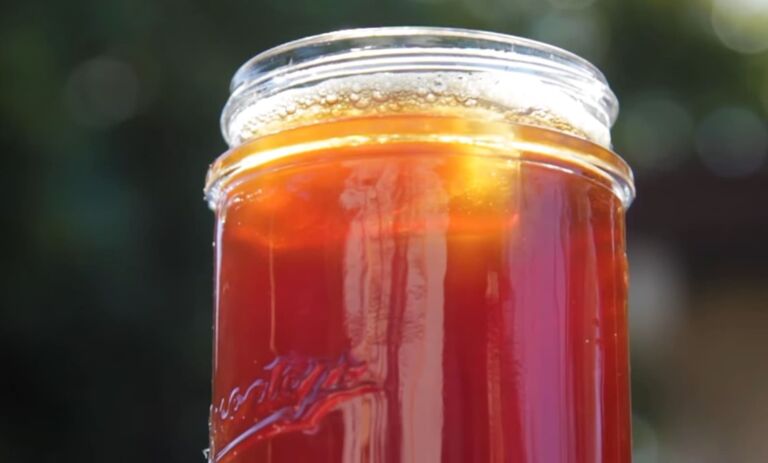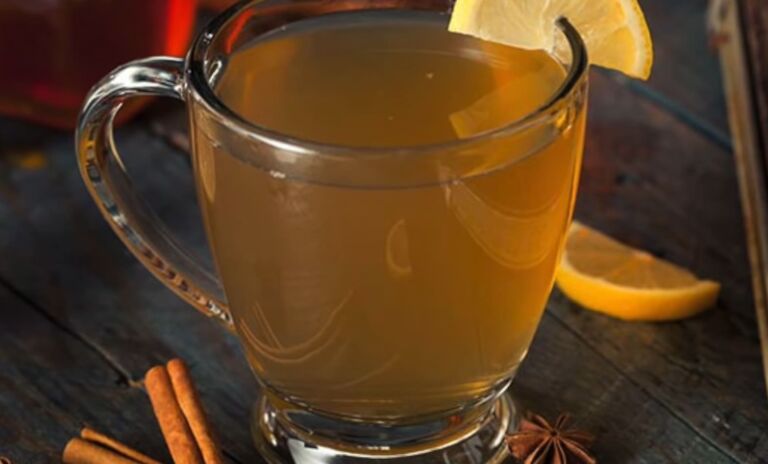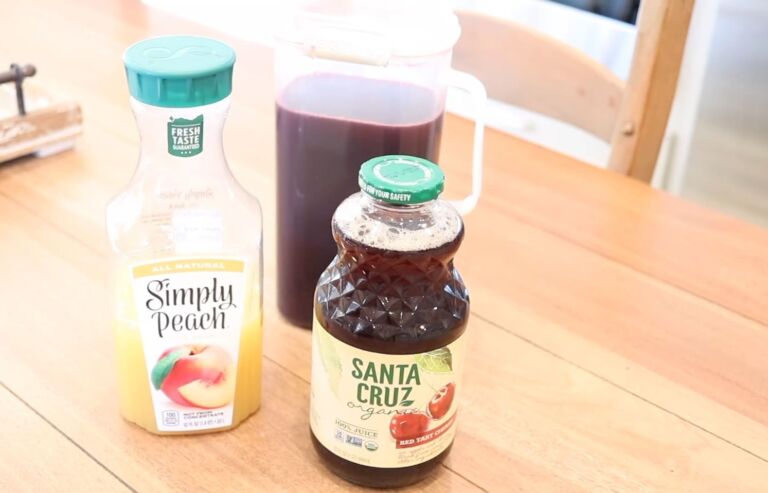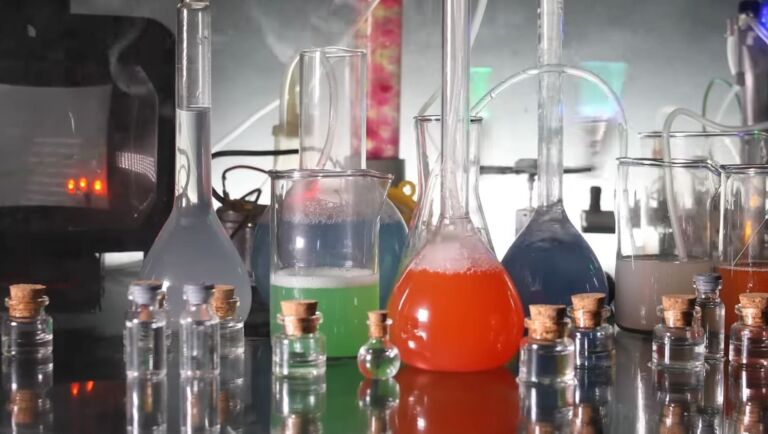Can You Freeze Kombucha?
Health-conscious consumers are increasingly turning to kombucha, the bubbly fermented tea drink overflowing with probiotics. But with the rising popularity of this tart elixir comes questions from kombucha lovers about how to store their brew. Can you freeze your latest kombucha to pause fermentation and extend its life? What is the best method for freezing, and how long does frozen kombucha last? Will freezing affect the taste, carbonation, and potency of its beneficial live cultures? Before you stash that second ferment in the freezer, look at the science behind freezing kombucha and the ideal techniques to preserve its flavor and health benefits when you’re ready for an icy cold glass of this fermented tea.
Quick Summary
You can freeze kombucha to pause fermentation and extend the shelf life. However, freezing can negatively impact kombucha’s taste, carbonation, and texture.
When frozen, the fermentation process stops completely. This puts yeast and bacteria growth on hold and halts the production of beneficial compounds like acids, vitamins, gases, and alcohol. While freezing preserves the nutrients already present, it damages the cell structure of the kombucha. Ice crystals rupture cell walls, releasing water that leads to a flat, diluted taste once thawed. The natural carbonation is also lost as CO2 bubbles dissipate.
If stored properly in airtight containers, frozen kombucha can last 2-3 months before quality starts to decline. Thaw overnight in the refrigerator for best results. While generally safe to drink when thawed, the kombucha will lack its signature fizziness and bright, tart flavor. The mouthfeel may also be thinner and watery compared to fresh kombucha.

For long-term storage, freezing extra SCOBY cultures is fine and keeps them dormant for 6-12 months. But avoid freeze-thaw cycles with the finished kombucha liquid whenever possible. Refrigeration is a better option for maintaining flavor and carbonation, as it slows fermentation compared to completely stopping it like freezing does.
In summary, freezing can extend the shelf life of homemade kombucha, but refrigeration is ideal. Limit freezing to an occasional backup supply, and drink kombucha within one month when refrigerated. Thawed, frozen kombucha will have a different taste or fizz than fresh. For optimal flavor and experience, avoid freezing kombucha and refrigerate what you can’t drink within a reasonable timeframe.
Freezing Kombucha
Kombucha is a fermented tea drink prized for its refreshing taste and beneficial probiotics. However, its live cultures mean it continues fermenting during storage. Freezing kombucha can pause this fermentation to extend its shelf life while preserving nutrients. But freezing also affects the flavor, carbonation, and texture that make kombucha so enjoyable.
Effect of Freezing on Kombucha
Freezing kombucha halts the fermentation process. This stops:
- Production of alcohol and acidic compounds
- Release of carbon dioxide that makes kombucha fizzy
- Growth and activity of yeasts and bacteria
Nutrients like probiotics, vitamins, and polyphenols remain intact when frozen. But freezing causes damage to the cell structure of the kombucha liquid and SCOBY:
- Cell walls rupture, releasing water that dilutes the flavor
- Carbon dioxide bubbles are lost, eliminating natural carbonation
This makes thawed kombucha taste flat with muted flavor notes. The texture also becomes thinner and watery compared to fresh kombucha.
Storing Frozen Kombucha
Kombucha can be frozen in glass jars, plastic containers, or bags. Key tips:
- Leave 1-2 inches of headspace in containers for expansion
- Avoid freeze-thaw-freeze cycles by freezing in desired portions
- Label contents and date to track shelf life
- Freeze quickly in one batch to prevent partial thawing
Frozen kombucha lasts 2-3 months before degrading. Thaw overnight in the refrigerator before drinking.
Freezing the SCOBY
Freezing extra SCOBYs long-term is a common practice. To freeze:
- Rinse off cellulose on top for better freezing
- Place in an airtight bag with starter liquid to remain hydrated
- Thaw in fridge 1-2 weeks before use
Frozen SCOBYs last 6-12 months and restart fermentation once thawed.
Drinking Frozen Kombucha
While safe to drink, frozen kombucha has a flat, diluted taste. Some recommendations:
- Mix with fresh kombucha to improve flavor
- Blend with fruit juice or herbs for a slushie texture
- Consider using frozen kombucha for cooking instead of drinking
- Limit freezing cycles to preserve more taste and carbonation
In summary, freezing can extend kombucha’s shelf life up to 3 months, but refrigeration improves taste and quality. Drink frozen kombucha soon after thawing for maximum freshness.

Thawing Kombucha
Kombucha is a fermented tea drink that continues to ferment in the refrigerator slowly, gradually changing taste over time. Freezing halts this fermentation process, preserving kombucha for months while retaining its flavor and health benefits. However, frozen kombucha must be adequately thawed before it can be consumed. This section covers key considerations and best practices for safely thawing frozen kombucha to drink.
Refrigerator Thawing
This involves placing frozen kombucha containers in the refrigerator and letting them slowly thaw overnight or for 12-24 hours. The gradual thawing process helps prevent drastic temperature changes that can negatively impact the flavor. Refrigerator thawing takes longer but is gentler on the kombucha.
Room Temperature Thawing
Another option is leaving frozen kombucha to thaw on the kitchen counter at room temperature. This thawing method is faster, allowing kombucha to liquefy in 2-3 hours. However, melting too quickly risks excessive temperature changes that can alter taste. Carefully monitor the thaw time and prevent kombucha from rising above 85°F.
Handling Kombucha During Thawing
As frozen kombucha turns back to liquid, some changes will be observed:
- Settling of yeast particles and cloudiness on the bottom
- Separation into layers of more transparent liquid on top
- Loss of carbonation leaving kombucha flat
These are all expected results of the freeze-thaw process. Gently swirling or shaking the kombucha once fully thawed will remix any separation. Avoid shaking carbonated kombucha to prevent overflow.

Drinking Thawed Kombucha
Once thawed, kombucha is safe to drink, but the taste and mouthfeel will be different than fresh kombucha. Expect:
- Flat, diluted taste from cell damage
- Cloudy appearance as cultures redistribute
- Softer, thinner texture and less viscosity
For best quality, drink thawed kombucha within 3-5 days and avoid freezing and thawing the same batch multiple times. Refreezing degrades both flavor and health benefits.
Storing Thawed Kombucha
Refrigerate thawed kombucha immediately and consume within a week for best flavor and carbonation retention. The probiotics remain alive, so fermentation restarts at cooler temperatures. Minimize yeast and bacteria growth by storing thawed kombucha at 34–40°F.

FAQ
What happens when you freeze kombucha?
Freezing kombucha pauses the fermentation process, stopping the production of acids, carbon dioxide, and alcohol. The cold temperature preserves the nutrients, probiotics, vitamins, and antioxidants produced during active fermentation. However, freezing can negatively affect kombucha in a few ways:
- Loss of carbonation – The CO2 bubbles that make kombucha fizzy are lost during freezing. The thawed kombucha tastes flat.
- Diluted flavor – Freezing ruptures cell walls in the SCOBY, releasing water that dilutes the flavor once thawed. Kombucha tastes watery.
- Texture changes – Freezing alters the look and mouthfeel, making kombucha thinner and less viscous.
Overall, freezing preserves the nutritional content but compromises the taste, texture, and fizziness that make kombucha enjoyable.
How long does frozen kombucha last?
Adequately stored in airtight containers, frozen kombucha maintains quality and potency for 2-3 months. Over time, nutritional content like probiotics and vitamins start to degrade. After three months, frozen kombucha declines in quality with diminished health benefits. For best results, drink frozen kombucha within 2-3 months.
Should I freeze my SCOBY?
Freezing is an easy, long-term storage method for preserving a kombucha SCOBY between brewing cycles. Freeze spare SCOBYs in airtight bags with a bit of starter tea from a previous batch. Frozen SCOBYs keep for 6-12 months. Thaw in the fridge before using it to brew again. Freezing stops SCOBY growth and fermentation until ready to use again.
What’s the best way to freeze kombucha?
For best quality frozen kombucha:
- Use airtight containers like mason jars or freezer bags. Exclude oxygen.
- Leave 1-2″ headspace for expansion. Avoid breakage.
- Freeze quickly in one batch to prevent partial thawing.
- Label with kombucha type and freeze date for tracking.
- Thaw in refrigerator before drinking to protect flavor.
Freezing in smaller portions allows defrosting just what you need while keeping the rest frozen.
Should I drink kombucha after freezing?
Frozen and thawed kombucha is still safe to drink. Freezing prevents microbial contamination, and kombucha alcohol content remains static after thawing. However, the carbonation, taste, texture, and appearance changes may be undesirable. Some drinkers feel freezing ruins kombucha’s flavor and fizz. But if you don’t mind the flat, watery taste, frozen kombucha still provides probiotics, acids, and nutrients with diminished enjoyment.
In summary, freezing kombucha for short periods can extend its shelf life. But refrigeration is best for maintaining taste and quality in homemade kombucha.
Related Video: Can You Freeze Kombucha?
Final Words
Kombucha is a probiotic-rich fermented tea prized for its tart, refreshing taste. However, its living culture means kombucha continues slowly fermenting over time, even when refrigerated. Freezing can temporarily pause this fermentation process to extend the shelf life of homemade kombucha for up to 2-3 months. While freezing does not harm the nutritional components like probiotics, vitamins, and antioxidants, it can negatively impact kombucha’s taste, carbonation, and texture once thawed. Cell damage from ice crystals forming causes kombucha to lose its signature fizziness and take on a flat, diluted, watery mouthfeel. For the best flavor, aroma, and bubbly effervescence, it is ideal for brewing kombucha in quantities that can be consumed when fresh and storing any excess in the refrigerator. Refrigeration at cool temperatures slows fermentation and maintains carbonation and quality much better than freezing. Freezing should only be done if you cannot finish your kombucha within a reasonable timeframe, as refrigeration lasts 1-2 months. While safe to drink when thawed, frozen kombucha is altered from its peak deliciousness when fresh. For maximum enjoyment of your homebrewed kombucha, avoid freezing it whenever possible.







